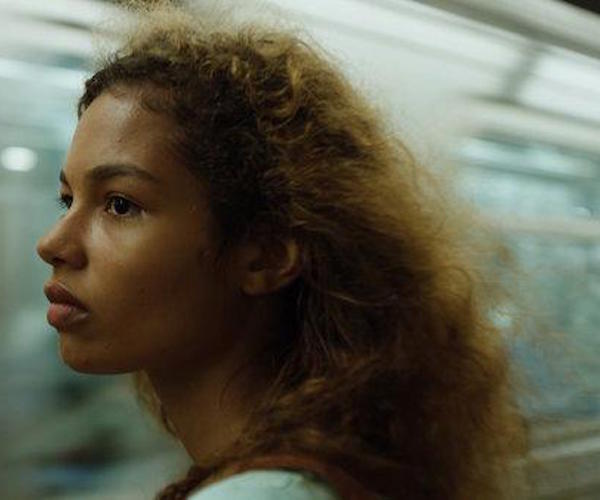Film Review: “Madeline’s Madeline” — Life Intensifies Art
Indie filmmaker Josephine Decker creates a brilliant showcase for Helena Howard, whose performance is electrifying.
Madeline’s Madeline, written and directed by Josephine Decker. Special limited engagement through September 20 at the Brattle Theatre, Cambridge, MA. (Writer-director Josephine Decker will be at the September 15 screening at 7 p.m.)

Helena Howard in “Madeline’s Madeline.”
By Peg Aloi
In this unusual, intense, and intimate film, a teenage girl’s creative inner life is twinned with her often traumatic existence. The narrative opens with a scene that contains a disturbing hint of familial violence along with the suggestion that someone is being cared for in a hospital or some other facility. After that introduction, events spiral in and out of the narrative, reality interlaced with what might be paranoid delusion. Sixteen year old Madeline (newcomer Helena Howard) lives with her mother Regina (played by filmmaker and actress Miranda July) and young brother: she yearns to be an actress. Her main activity seems to be rehearsing endlessly in a dance/theatre troupe in NYC. She appears to be younger than the other performers, but the troupe’s director, Evangeline (Molly Parker, understated but compelling to watch) is convinced Madeline has enormous talent and potential. There’s a subtle sense of separation between Madeline and the other performers, as if they know she is fragile and that they should walk on eggshells around her. Madeline imagines that her fellow dancers talk about her behind her back.
When Regina picks Madeline up from rehearsal they argue in the car. Her mother is in tears, believing that the other troupe members were making fun of her daughter. But Regina also complains that driving Madeline to and from rehearsal is a chore. Her protectiveness seems borne of genuine concern, but there’s also a hint of instability as well as unchecked rage. As the plot unfolds, it’s obvious that there are two versions of the family dynamic: the one Madeline presents, and the one her mother articulates. Is one of them more emotionally unstable than the other? Are they both equally confused? It’s hard to sort out the truth, but what seems clear is that Madeline’s path to expressing herself is focused on her work with the dance troupe.
Evangeline mentors Madeline’s acting aspirations. She knows there are difficulties at home, so she serves as a sort of surrogate mother for her. This becomes complicated once Evangeline announces she is pregnant. Early scenes suggest that Madeline’s tortured relationship with her mother (who clearly has emotional problems) is a sort of catalyst for her raw, courageous brilliance as a performer. As her work with the troupe continues, Evangeline coaxes Madeline to reveal more of her inner turmoil. Whether this confession functions as cathartic release (as theatre is often meant to) or a form of enabling is ambiguous. A photo shoot that’s done for the troupe’s next performance pieces allows Madeline’s smoldering sexuality to peek through. It’s becomes obvious that she is almost too much for the adults around her to handle. Madeline has ambition and maybe even the confidence to navigate a future in performing. But so much about her is still unformed and untried. When she attends an adult gathering, where there is alcohol, it suggests that her coming of age has been pushed too quickly, that Madeline’s behavior is unchecked. But there is also a sense that her stressful home life is partly of her own making.
Indie filmmaker Josephine Decker has come up with a brilliant showcase for Helena Howard, whose performance is electrifying. Her Madeline is multi-layered: a complex creation that fuses earthy sensuality and nimble intelligence. Howard’s beauty and physical grace are alluring, but it’s her emotional maturity as an actress — in the role of a young woman who is learning to be an actress — that is stunning to watch. She displays preternatural control over every facial expression and gesture, yet there is a continual intimation of a sort of wild, simmering power that could burst forth at any moment. She is a performer who deserves many more opportunities to be seen after this astonishing debut.
Peg Aloi is a former film critic for The Boston Phoenix. She taught film and TV studies for ten years at Emerson College. Her reviews also appear regularly online for The Orlando Weekly, Crooked Marquee, and Diabolique. Her long-running media blog “The Witching Hour” can be found at at themediawitch.com.
